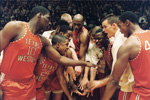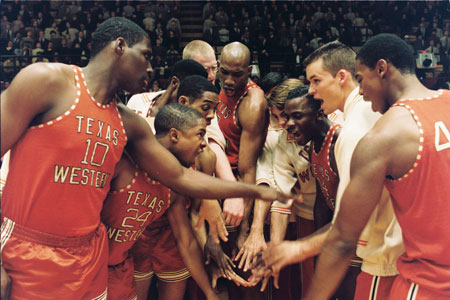Glory Road
 “Glory Road” opens as though it were Jerry Bruckheimer’s wet dream—a title sequence that plays out like a trailer. Why do we need the flashcards-for-dummies approach? We’re already there, seated. I feel like I’m watching George Bush’s second term sound-bite speeches that, despite two wins, still sound like…
“Glory Road” opens as though it were Jerry Bruckheimer’s wet dream—a title sequence that plays out like a trailer. Why do we need the flashcards-for-dummies approach? We’re already there, seated. I feel like I’m watching George Bush’s second term sound-bite speeches that, despite two wins, still sound like…

L-R: Damaine Radcliff, Sam Jones III, Alphonso McAuley, Al Shearer & James Olivard (obscured),
Schin A.S. Kerr, Mitch Eakins, Derek Luke, Austin Nichols, Mehcad Brooks.
Photo Credit: Frank Connor. © 2005 Disney Enterprises, Inc. All rights reserved.
“Glory Road” opens as though it were Jerry Bruckheimer’s wet dream—a title sequence that plays out like a trailer. Why do we need the flashcards-for-dummies approach? We’re already there, seated. I feel like I’m watching George Bush’s second term sound-bite speeches that, despite two wins, still sound like campaign pitches.
Like ten of the twelve theatrical trailers before it, this movie is “inspired by a true story.” I’m not sure that phrase ever had any meaning, but I’ll get back to addressing the myriad clichés of this film later. This is the story of Don Haskins (Josh Lucas), recruited by Texas Western to coach NCAA Division 1 basketball, and his ragtag team of misfits… sorry, for a minute there I lapsed into thinking I was writing a treatment for Michael Bay. I guess I should consider myself fortunate this film was directed by newcomer James Gartner. But, as luck would have it, he seems only to be a Michael Bay in training.
Haskins is invited without much financial reward, but as a consolation, he and his family can live in the dorm and eat cafeteria food. I lived on dorm food for three years. I have a sense it’s a step down from prison food. The floor of the court is rickety, the school, we’re reminded repeatedly, can barely afford to buy a paperclip. Somehow, they’re supposed to recruit a team. While Haskins and his assistant coach travel the country to assemble one, they have only the promise of a dream to offer. For some of the boys, the prospect of moving into southern Texas seems like a high price to pay for such an opportunity.
Haskins pursues a couple of kids playing street basketball in Gary, Indiana. They think he’s coming after them for all the wrong reasons, and run. When they get home, he’s already there, talking to one boy’s mother over a piece of pie. He recruits a couple others at a YMCA. Eventually, the team is pulled together and bused to El Paso. One by one these young men assert themselves in the cafeteria, and end up playing a pickup game with a head of lettuce and a garbage can. The townspeople are wary of them, the school’s primary benefactor doesn’t like the idea of blacks playing basketball, and in fact, it’s true that the Texas Western Miners were, historically, the first integrated college basketball team in the South. Eventually Haskins gets threats, but this doesn’t deter him.
The problem is, we really don’t know why. As far as I know, Haskins is just another coach from the South. We’re not given any frame of reference for understanding why he should feel any different from, obviously, every other basketball coach in the entire region that wouldn’t sign African-Americans at the time. We’re also given little, if any, insight, into the boys lives before they’re recruited. How can we understand when they repeat—ad nauseum—how far they’ve come, if we don’t firmly grasp where they started?
This isn’t the only flaw with the story. There are several. It’s obvious from the get-go that Jerry Bruckheimer isn’t very likely to involve himself in a film that goes beyond—as Pauline Kael stated in her essay “Why Are Movies So Bad? or, The Numbers”—merely giving the masses what they’re willing to settle for. In fact, just this week CNN.com published an interview in which he tried to pre-empt such publicity by stating how every project he produces is instantly going to invite criticism. Why do you think that is, Jerry? Might it be your tendency to mass produce commercial-grade shlock made easily digestible for mass consumption? Human nature dictates that, while not entirely impossible, it’s highly improbable that you’re going to shift gears from playing the numbers game to making a serious movie with legitimately creative intentions.
So, knowing this, I don’t need to laboriously itemize the various montages or detail every inch of pedestrian dialogues, lectures and speeches. I will say that I think I’m beginning to understand why mainstream Hollywood loves “feel good” sports movies. It’s not only because they can easily engineer a positive ending, street-level suspense and a black-and-white universe where the winners are good and the losers are evil, with that winning point in the last second scored by the underdogs… It’s also because, if you’ve ever heard a real coach, or commentator, or owner speak, you understand that sports is rife with philosophical platitudes—making the screenwriter’s job exceedingly simple. All you have to do, as was done in this film, is create an endless string of aphorisms where every line of dialogue is a lecture, or speech or monologue serving up heapfuls of blinding glimpses of the obvious for the average audience to eat up in between training montages and games where winning, as Yogi Berra famously said, is positioned to the audience as the only thing that matters.
Last year’s “Friday Night Lights” differed in that regard and surprised me greatly. Even though that film could be deconstructed as shlock disguised as a meaningful lesson about losing with dignity, it still perches in the hierarchy of banal rah-rah-sis-boom-bah films well above “Glory Road.” This film’s final, and most egregious, error, is that it pretends to be a movie about equality, all the while trumpeting an insidiously racist message: The good and evil is done to blacks by white men, while the black characters’ primary function is not to win our hearts and minds on their own terms for who they are, but by providing us entertainment—a Stepin Fetchit in a jersey and sneakers. Note that in scenes where the black basketball players are interacting with other blacks, the whites take on the typical role of uncool, awkward nerds. By contrast, the blacks are potrayed much as they are in the majority of American cinema, as the jive-talking comic relief with their endless string of sharp witticisms.
It’s interesting to note that women play almost no role whatsoever in this film which repeatedly reminds us it’s about “a lot more than a game” to one minority—managing to almost entirely exclude another. Haskins’ wife, and Tina (Tatyana Ali)—a girlfriend of one of the players—have extremely minor roles in the film other than the usual Hollywood role reserved for female supporting actors: They serve exclusively as emotional support systems for men. Also, what’s the story with the Hispanic guy on the team? We don’t get to know him, at all…
Most audiences will think this is a film about the “triumph of the human spirit” or some such monosyllabic shit… The truth is, it’s a racist film that convinces its audience, perhaps without them ever realizing it, that all that defines the African-American is a disregard for authority fueled by resentment of racial discrimination, an inability to utter a single sentence without slapping some sort of clever and humorous derision at the end of it, and a collective—almost religious—belief that the only opportunity they have in our society is to play a competitive sport as if there is no other dimension, vocation or craft in which one can apply their mind and/or body.
This monochromatic view of blacks, both in history and, presumably, of the target audience of this film, is further reinforced by having the actors continuously self-aware of their blackness and having almost every other actor in the film observe the implausibility of blacks playing good basketball—we’re supposed to snicker with delight with the forward knowledge that, hardy-har, whites are now outnumbered in that sport. It wouldn’t be such a painful humor device if it weren’t so deliberately forced down our throats. There’s a much more honest and relatively downplayed moment of humor when one of the whites on the team talks with his black teammates, trying to understand the emerging slang usage of the word “bad”—”bad… is good.” Had the rest of the film dealt so sincerely with the subject of ignorance, it might have been good.
If there is a reason that African-Americans actually might believe this cliché stereotype of themselves, it’s because white studio executives are constantly patting themselves on the back for regurgitating this formula back to the masses, thus assisting in perpetuating the collective social belief that the aforementioned is all there is to being black in America. That the film appears to have been made with the consent and input of some of the still-living participants in this story does not negate what I have said. People often fail to recognize when they’re being exploited, and that is most especially true in Hollywood.
 Glory Road • Dolby® Digital surround sound in select theatres • Running Time: 106 minutes • MPAA Rating: PG for racial issues including violence and epithets, and mild language. • Distributed by Buena Vista Pictures
Glory Road • Dolby® Digital surround sound in select theatres • Running Time: 106 minutes • MPAA Rating: PG for racial issues including violence and epithets, and mild language. • Distributed by Buena Vista Pictures